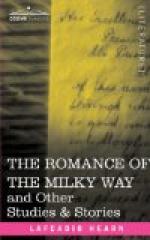Homes are protected from evil spirits by holy texts and charms. In any Japanese village, or any city by-street, you can see these texts when the sliding-doors are closed at night: they are not visible by day, when the sliding-doors have been pushed back into the tobukuro. Such texts are called o-fuda (august scripts): they are written in Chinese characters upon strips of white paper, which are attached to the door with rice-paste; and there are many kinds of them. Some are texts selected from sutras—such as the S[^u]tra of Transcendent Wisdom (Prag[n]a-P[^a]ramit[^a]-Hridaya-S[^u]tra), or the S[^u]tra of the Lotos of the Good Law (Saddharma-Pundarik[^a]-S[^u]tra). Some are texts from the dh[^a]ran[^i]s,—which are magical. Some are invocations only, indicating the Buddhist sect of the household.... Besides these you may see various smaller texts, or little prints, pasted above or beside windows or apertures,—some being names of Shinto gods; others, symbolical pictures only, or pictures of Buddhas and Bodhi-sattvas. All are holy charms,—_o-fuda_: they protect the houses; and no goblin or ghost can enter by night into a dwelling so protected, unless the _o-fuda_ be removed.
[Footnote 59: H[’e]gashi is the causative form of the verb h[’e]gu, “to pull off,” “peel off,” “strip off,” “split off.” The term Fuda-h[’e]gashi signifies “Make-peel-off-august-charm Ghost.” In my Ghostly Japan the reader can find a good Japanese story about a Fuda-h[’e]gashi.]
Vengeful ghosts cannot themselves remove an o-fuda; but they will endeavor by threats or promises or bribes to make some person remove it for them. A ghost that wants to have the o-fuda pulled off a door is called a Fuda-h[’e]gashi.
H[’e]gasan to
Rokuji-no-fuda wo,
Yur[’e][:i] mo
Nam’mai d[=a] to
Kazo[:e]t[’e] zo mini.
[Even the ghost that would remove the charms written with six characters actually tries to count them, repeating: “How many sheets are there?” (or, repeating, “Hail to thee, O Buddha Amit[’a]bha!"[60])]
[Footnote 60: The fourth line gives these two readings:—
Nam’mai da?—“How many sheets are there?”
Nam[u] A[m]ida!—“Hail, O Amit[^a]bha!”
The invocation, Namu Amida Butsu, is chiefly used by members of the great Shin sect; but it is also used by other sects, and especially in praying for the dead. While repeating it, the person praying numbers the utterances upon his Buddhist rosary; and this custom is suggested by the use of the word kazo[:e]t[’e], “counting.”]
Tada ichi no
Kami no o-fuda wa
Sasuga ni mo
Norik[’e] naku to mo
H[’e]gashi kan[’e]k[’e]ri.
[Of the august written-charms of the god (which were pasted upon the walls of the house), not even one could by any effort be pulled off, though the rice-paste with which they had been fastened was all gone.]




